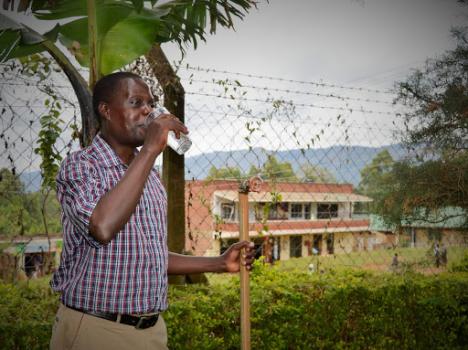Exploring Water Services on the Brink
Water utilities and smaller water service providers throughout sub-Saharan Africa are under great financial strain as they juggle COVID-19 mandates to expand services at a time when revenue has plummeted. How they respond in the coming months will determine whether millions of people will be a risk of losing basic water access or backsliding down the drinking water service ladder. A newly released analysis of the sector, “Water Services on the Brink,” relying on data from the International Benchmarking Network for Water and Sanitation Utilities from the World Bank’s Alexander Danilenko, uses the experiences of Kenya and Uganda service providers to examine the extent of the revenue shortfalls, the causes, and the ramifications on operations and the 26 million people they serve.
A constellation of factors have led to a precipitous drop in water revenues. Countrywide lockdowns and travel restrictions are bringing industry to a standstill. In many instances, utilities rely on its commercial/industrial customers to pay more for water, cross-subsidizing its domestic users. Yet with commercial activity largely on pause, revenue is being cut anywhere from 48 percent to 78 percent. This is happening at the same time that governments are demanding service expansion to health clinics, quarantine facilities, and informal settlements; bills are going uncollected; and non-disconnection policies are being put into place. Ensuring that everyone has access to water for COVID-19 prevention is good from a health perspective—it is basic personal protective equipment—but challenging to the financial health of these service providers, and in the medium- to long-term, to the customers that rely on them.
As a result, cost-saving measures are being put in place that are already leading to more intermittent water delivery, compromised water quality, and deferred maintenance. A critical pillar of USAID’s response to COVID-19 is providing support to water service providers to ensure continuity of services. As a first step, USAID is joining the World Bank and other development partners in helping conduct stress tests in Kenya, Mozambique, and Zambia and elsewhere. The process will help water service providers quantify the financial impact of the pandemic on their operations and prioritize their response options. Once needs and priorities are determined, resources will be needed to counter falling revenues and rising costs, requiring coordinated action from governments, development partners, and water utilities themselves.
Read the full analysis here.
by Alexander V. Danilenko, Senior Water and Sanitation Specialist, World Bank, Abigail Jones, Water and Sanitation Specialist, USAID RFS Center for Water Security, Sanitation and Hygiene


